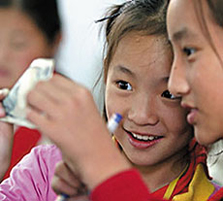
overty
is valuable.” That startling moral insight was the title of an essay
submitted by a student from a School for Migrant Workers’ Children to
the Laws of Life competition run by Junior Achievement China. Gao Yang,
director of the JA China project, recounts how this

positive outlook
engaged her. “He’s from a disadvantaged environment, but what he had
learned from the poverty taught him a lot of good character,” she explains,
and so this student came to the conclusion that “being poor should not
be a reason for him not to work hard.”

JA China has expanded significantly in its four years’ existence. In
school year 2004/2005, just 5,900 students participated. The following
year that figure increased to 30,160. Today it has reached its target
figure of 160,000 students. Originally restricted to Beijing and Shanghai,
it now has a presence in a third major city, Guangzhou, capital of Guangdong
province, thanks to a strong partnership with the city’s Bureau of Education.

Government support has been crucial and generous. In 2006, President
Hu Jintao stressed the importance of character and ethics programs for
Chinese students and encouraged all schools to participate in such projects.
This gave an impetus to the program, which has received warm endorsement
from the authorities. In the words of Gao Hong, director of the Basic
Education Department of the Ministry of Education, “Based on the abstract,
as well as real experience and inspiration, the laws of life will become
deeply rooted in the soul of the students, integrated into their blood,
becoming a way of living.”

Inculcation of character is especially important at this juncture in
China’s history, partly because of the changed nature of family life,
partly because of the impact of massive economic development. A consequence
of the one-child policy has been a tendency among parents to spoil their
offspring. “The current generation is all one-child families,” says Gao
Yang, “they’re very different from previous generations in China. They
basically get everything they want. The challenge for us is educating
the future generation with the one child.” She laughs, “We call them
‘little emperor’.”

JA is creating the infrastructure for this character-building mission.
More than 2,500 teachers have already been trained to implement the Laws
of Life Essay Contest in the three cities so far involved, working in
400 schools. The students do not simply pick up a pen and start writing;
the preparation is painstaking. “Actually it’s a semester-long program,”
explains Gao Yang, “a ten-week program. They would start, with the help
of the teachers, going through the questions, engaging in self-reflection.
They would exchange views with their classmates, with the volunteers,
and then the teachers and parents.”

The volunteers to whom she is referring come from the business community.
They share with the students their core values and their corporate and
personal philosophy. Gao Yang sees their contribution as “really a great
attribute, a value we can add to this program although the numbers of
volunteers are not significant.” She also attaches great importance to
the success JA has had in drawing not only the Chinese public schools,
but also the much more disadvantaged Migrant Workers’ Children Schools
and the Hope Schools in the rural areas into participation in the Laws
of Life competition. It was from this underprivileged social echelon
that the student emerged who wrote the thought-provoking essay “Poverty
is valuable.”

But Gao Yang is anxious to keep the social benefits of the project, at
least so far, in realistic perspective. “We don’t have a kid from a Migrant
Workers’ School who’s become an entrepreneur, or anything like that,”
she says. “But we do see some of them successfully enter college.” At
the same time, she is hugely optimistic about the future prospects for
JA, especially now that it has such strong support from the government.

“I think in the next three years we can reach a million,” she says. As
for the longer-term prospects, over the next five to ten years, “If we
are fully committed to this program, I would say the number could be
five million, seven million—that we can impact not only three cities,
we can impact ten cities potentially, partnering directly with the national
level of the Education Ministry.”

Outreach and dissemination are rapidly expanding. A compilation book
of the best essays is published annually and Sohu.com, China’s most popular
internet outlet, is publishing them online. Television channels such
as China International TV and Dragon TV have given extensive coverage
to the project.

Gao Yang believes the most important question JA’s students are addressing
is “How to be a contributor to the future of society with character,
creativity, and leadership so that they can be the future?” The conclusion
she draws from the experience of Junior Achievement China is, “The big
question that Sir John Templeton asked—Is free enterprise a teacher of
ethics and character?—is really the right question here for China.”



 positive outlook
engaged her. “He’s from a disadvantaged environment, but what he had
learned from the poverty taught him a lot of good character,” she explains,
and so this student came to the conclusion that “being poor should not
be a reason for him not to work hard.”
positive outlook
engaged her. “He’s from a disadvantaged environment, but what he had
learned from the poverty taught him a lot of good character,” she explains,
and so this student came to the conclusion that “being poor should not
be a reason for him not to work hard.”